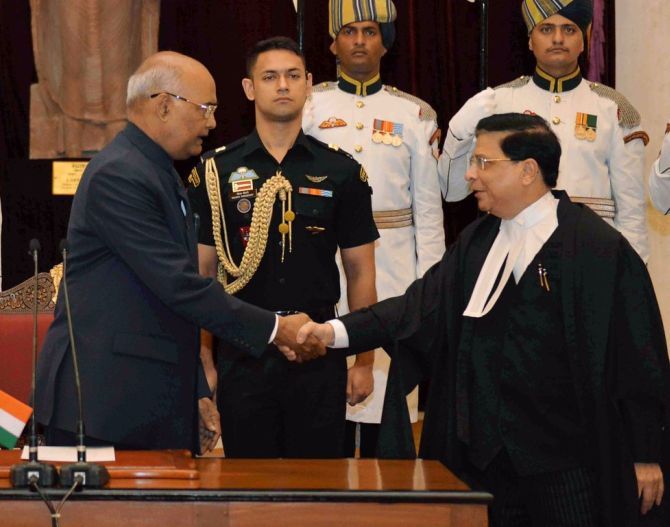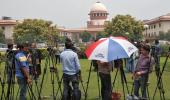'Even the ruling party -- if it really respects the independence of the judiciary and democracy -- should support this impeachment motion.'

IMAGE: Justice Dipak Misra is sworn in as the 45th Chief Justice of India by President Ram Nath Kovind at Rashtrapati Bhavan, August 28, 2017. Photograph: @rashtrapatibhvn/Twitter
The Congress and other Opposition parties have submitted a notice to initate impeachment proceedings against Chief Justice Dipak Misra.
This is the first time in India's history that a motion to impeach a Chief Justice of India has been presented.
Over 64 MPs belonging to 7 political parties have signed the notice for impeachment proceedings against the CJI.
The parties include the Congress, the Nationalist Congress Party, the Communist Party of India-Marxist, the Communist Party of India, the Samajwadi Party, the Bahujan Samaj Party and the Indian Union Muslim League.
MPs from these parties met Vice President M Venkaiah Naidu -- who is also the chairman of the Rajya Sabha -- on Friday, April 20, 2018, and gave notice for the impeachment of the CJI.
Seventy-one Rajya Sabha MPs had signed the notice for impeachment, but as seven retired, the number now is 64.
An impeachment motion in the Rajya Sabha has to be supported by at least 50 MPs of the Upper House.
The number of MPs supporting such a motion in the Lok Sabha is 100.
Once a notice for an impeachment motion is submitted to the Rajya Sabha chairman, he will ascertain if there is merit or ground for moving such a motion.
In case he finds merit, then he may form a committee to look into it, else he can reject it.
Addressing a press conference after the MPs met Naidu, former Union minister Kapil Sibal -- a senior lawyer himself -- said, 'We have moved a motion for removal of the Chief Justice of India under five grounds of misbehaviour.
'Chief Justice Dipak Misra violated Constitutional norms while exercising his powers,' Sibal said.
'When Supreme Court judges believe the judiciary's independence is under threat, alluding to the CJI's functioning, should we stand still and do nothing?'
'We wish this day had never come in the fabric of our Constitutional framework. Since the day he (Justice Dipak Misra) was appointed as CJI there have been questions raised in the manner in which he has dealt with certain cases,' Sibal alleged.
A Supreme Court bench of Justices A K Sikri and Ashok Bhushan, meanwhile, termed as 'unfortunate' the statement made by lawmakers on impeaching the CJI, but refused to issue a gag order while posting the hearing on the matter to May 7.
The Opposition's impeachment notice comes a day after the Supreme Court rejected a bunch of petitions seeking an independent probe into the death of Judge B H Loya who was hearing the Sohrabuddin Sheikh encounter case.
The Supreme Court judgment in the Loya case was delivered by a bench headed by the Chief Justice of India.
Earlier, as the Congress canvassed support from like-minded Opposition MPs for signing a motion to impeach the Chief Justice of India, senior Supreme Court advocate Dushyant Dave spoke to Rediff.com's Prasanna D Zore about the move.
What will be the impact of the Opposition-planned impeachment motion against the Chief Justice of India irrespective of its fate?
This is the most historic development today.
It is also the saddest development for the judiciary of the country.
Given the numbers that the Opposition has in both Houses of Parliament, do you think this impeachment motion will succeed even if it is tabled in Parliament?
It may not succeed, but the combined Opposition speaks on behalf of the more than 63 per cent votes that they polled in the 2014 general election.
The BJP won that election with 37 per cent vote share only.
The combined Opposition represents the majority of voters of the country and is saying that it has no faith in the Chief Justice of India.
The outcome (of this impeachment motion) is not important.
What matters more is that the Opposition political parties across the spectrum are showing their lack of faith in the Chief Justice of India. And this is a very serious matter for India's democracy.
How will this impeachment motion impact the functioning of the judiciary, regardless of the fate of the motion?
It will only help improve the (functioning of the) judiciary.
I am glad that the Opposition has raised this issue and even the ruling party -- if it really respects the independence of the judiciary and democracy -- should support this impeachment motion.
Do you think the Rajya Sabha chairman will accept such a motion?
He will not accept it.
The BJP is killing democracy in every possible sense and they are succeeding given their brute majority (in the Lok Sabha).
If 50 Rajya Sabha MPs sign for impeaching the Chief Justice of India, it will be the darkest day in the history of India's judiciary.
If the chairman of the Rajya Sabha disallows the impeachment motion, what can the Opposition do?
The Opposition can always move the courts and the judiciary has the right to correct the chairman's action. Such decisions can always be corrected using the judicial review.
I have complete faith in the Indian judiciary. I am sure truth will prevail ultimately.










